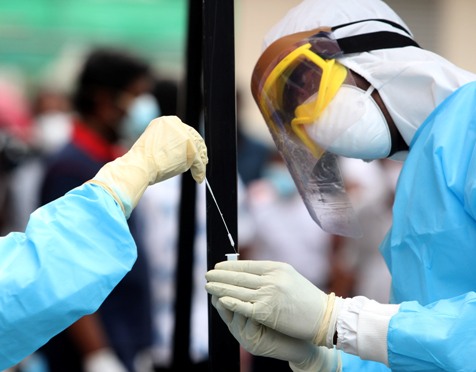Daily coronavirus tests plunge as lockdown extended
COLOMBO – Sri Lanka’s daily coronavirus tests plunged to 17,159 on Monday (24) from 25,680 on Friday (21), as health authorities clamped new restrictions on private and volunteer testing with the country going on a two week lockdown on warnings the health system was headed for a breakdown.
On Monday, 2,971 new COVID-19 cases were recorded, down from 3,547 on Friday.
Authorities imposed a literal lockdown, dubbed ‘movement restriction’ till June 7, as new cases spiralled out of control.
The Health Ministry barred private hospitals from conducting walk in tests, ordering tests be done only after a doctor orders one, a practice followed in the Western nations in the early days of the pandemic.
Ravi Kumudesh, President of the Medical Laboratory Technologists Association, slammed the decision saying the requirement creates an unnecessary contact between a doctor and a patient. “It allows doctors to earn a fee, but all this has to be paid by the people,” he said.
According to reports, private labs that carry out tests above the daily ceiling given by the government have been threatened with a ban on testing.
Those who test without a doctor’s order have also been threatened with a ban.
Sri Lanka’s testing on an ‘indication’ appears to be based on a ‘testing to diagnose’ strategy rather than a testing to trace strategy used by East Asian nations.
According to comments made on media, the restrictions on private testing may also have been done to reduce revenues and testing deemed ‘un-necessary’ by State authorities.
Sri Lanka generally tests a first contact about five to six days after contact, which is the average incubation period and results are also delayed when cases spike.
In countries such as Vietnam two tests are conducted within 24 hours on first contacts in institutional quarantine, not simply to diagnose but to determine whether second level contacts should be sent on institutional quarantine and tested, observers familiar with the practice say.
In a current outbreak, which is the worst yet, Vietnam has locked down several factories in situ. Workers are not allowed to go home and are supplied with food as mass tests are carried out and infected persons taken out.
Testing to trace, rather than testing to diagnose makes it easier to control outbreaks and bring them to zero, observers say and helps avoid or reduce lockdowns of the country or larger regions.
Even with lightening fast testing, which gives results in hours to contact tracers rather than days such as in Sri Lanka, Vietnam is struggling to reign in clusters apparently triggered by the Indian strain.
-economynext.com


